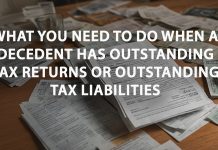Every year, about 9 million taxpayers miss tax deadline or fail to file their tax returns according to data from the Internal Revenue Service.
How To Handle Late Tax Returns?
The Treasury Inspector General for Tax Administration on May 29, 2020 issued a report finding that about 880,000 high-income nonfilers in tax years 2014 through 2016 had an estimated $45.7 billion in unpaid taxes.
The IRS has since announced that as part of a larger effort to ensure compliance and fairness, the IRS will step up efforts to visit high-income taxpayers making at least $100,000 who in prior years have failed to timely file one or more of their tax returns.
Following the recent and ongoing hiring of additional enforcement personnel and in anticipation of a COVID-19 pandemic being more manageable due to mitigation efforts and vaccinations, IRS Revenue Officers across the country will increase face-to-face visits with high-income taxpayers who haven’t filed tax returns in 2019 or previous years.
Failure to File vs. Failure to Pay
The IRS red flags taxpayers as “tax cheats” whether they are stop-filers, non-filers and under-filers.
“Stop Filer” is a term applied to taxpayers that consistently comply with tax filing requirements and then suddenly stop filing their returns. If your employer or client reports your income to the IRS on a 1099 or a W-2, the IRS will flag your information as a non-filer because they have access to tax forms that cannot be matched to tax returns. Understating your income, consciously or unintentionally, could result in a lower tax liability but make you liable for IRS penalties.
Failure to file means not filing the returns within the given time frame while failure to pay means filing the required paperwork but not turning in the full amount of tax obligation by the tax filing deadline. To force compliance with tax laws, the IRS is allowed to prepare a “substitute return” on behalf of those who failed to file, using data that was submitted by employers and applying customary exemptions and deductions. Substitute returns will always show a much higher liability than actual returns you have prepared and filed because substitute returns which are prepared by the IRS will not take into account your business expenses, basis in assets sold, itemized deductions, proper marital status, dependents and many tax credits.
Essentially, filing federal taxes late is better than not filing even if you cannot pay the tax dues at the time of submission. Penalties will still accrue for all unpaid tax obligations effective on the day after it is due until fully paid but by filing your tax return timely you avoid a late-filing penalty.
Why Taxpayers Should File Late Returns Now
There are important reasons why you should file your returns even if it is long past due. For one, penalties will continue to add up on any payments due. Also, if you are owed a refund due to exemptions, deductions and tax withheld, you only have three years from the original due date to claim the refund (and in certain cases this limitation is two years). When this period expires, you forfeit your refund to the IRS. Additionally, you would not be able to claim tax refunds for later years unless returns for the missing years are filed.
Loan applications, lease qualifications, scholarship applications and similar events require submission of tax returns from the previous years. Failure to present these documents that are used as proof of income may disqualify your application from moving forward. For self-employed taxpayers, filing a tax return is the only way that your credits for Social Security benefits can be reported and tracked. If you don’t comply with tax filing requirements, you would not build up enough retirement or disability credits.
Failure to respond and comply with an IRS tax bill will trigger the collection process, which may include tactics such as wage garnishment, an asset freeze or a federal tax lien.
IRS Penalties for Late Filing
The IRS assesses two different penalties for filing federal taxes late. The failure to file penalty is assessed at 5% for each month that the returns are late and is capped at 25%.
Assessments for failure to pay are 0.5% monthly for a maximum of 25%. If both penalties apply, the total amount is capped at 5% per month for a late tax return. If you qualify for a refund during the tax year in question, and you have not forfeited the refund, you may not be charged with penalties for taxes owed on a delinquent tax return.
Extending The Deadline To File
Starting with your 2020 tax return, if you will be unable to prepare your tax returns within the original deadline, file for an extension using the Form 4868, application for automatic extension of time to file U.S. individual income tax return on or before the deadline to file your Form 1040. Where an extension is timely filed, penalties for failure to file will not apply, but penalties will still be assessed on the balance due. With Form 4868, the revised deadline will be extended by six months for taxpayers in the U.S.
Additional IRS Civil Penalties For Non-compliance With Tax Laws
Criminal fraud refers to outright tax evasion. Penalties for tax evaders include hefty fines, imprisonment or both. Civil fraud charges applies to underpayment without intent to completely evade making tax payments. The penalty imposed may be as much as 75% of the portion of the underpayment. Negligence refers to inadvertent underpayment, and the penalty is 20% of the underpayment that is due to negligence. A frivolous return is one that intentionally excludes information that is crucial to processing the returns, and the penalty is $500 for each frivolous return.
What Should You Do?
Filing federal taxes late is a complicated matter. Let the tax attorneys at the Law Offices Of Jeffrey B. Kahn, P.C. located in Orange County (Irvine), San Francisco Bay Area (including San Jose and Walnut Creek) protect you from excessive fines and possible jail time. Also, if you are involved in cannabis, check out how a cannabis tax attorney can help you. And if you are involved in crypto currency, check out what a bitcoin tax attorney can do for you.








